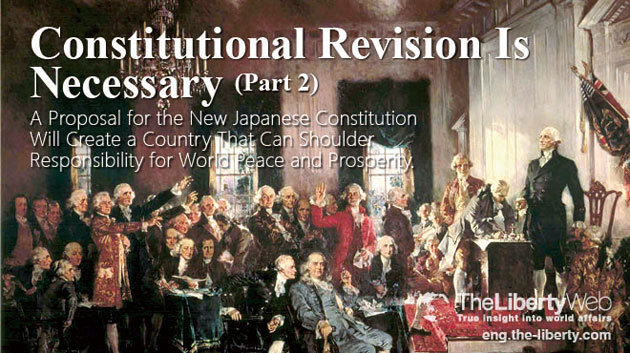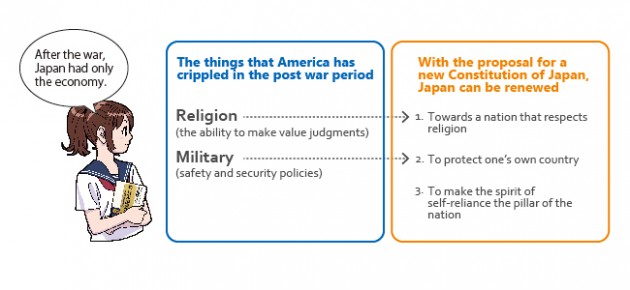Constitutional Revision Is Necessary (Part 2):
The Proposal for a New Constitution of Japan Will Create a Country That Can Shoulder Responsibility For World Peace and Prosperity.
The Current Constitution Has Crippled Religion and the Military
The current constitution was a policy enacted under the American occupation, established to weaken and to knock back Japan mentally and militarily so it could never fight back.
There are three elements for achieving national prosperity – religion (the ability to make value judgments), military (safety and security policies), and the economy (the stable economic growth). America paralyzed two of the three elements – religion and the military.
America tore down the nation’s Shinto religion, stipulating in the constitution that ‘no religious organization shall receive any privileges from the State, nor exercise any political authority’ (Article 20:1). This can be interpreted as follows: that no religion should have anything to do with politics or society, and in effect, the prohibition of religious education promotes this position.
However, by excluding religion (which is the source of right and wrong) from the face of society, Japan’s leaders have not been able to communicate the justice to the world, and it has also been a cause of non-action.
Restoring Normality to Religion and the Military
In terms of the crippling of the military, America controlled the media so that it could firmly plant a sense of guilt for the war and the military, and it eradicated any spirit for the protection of our country. Directions from America eventually ceased, but traces of the information control remain today.
In the memorandum, which formed the basis of the current constitution, written by General MacArthur, who held the position of Supreme Commander for the Allied Powers, Japan was forced to ‘rely upon the higher ideals which are now stirring in the world for its defense and protection’. MacArthur was basically saying that Japan ‘should leave its defense up to America’, and this idea has continued to the present times.
The three elements of a nation are ‘territory’, ‘citizens’, and ‘sovereign power’, but since Japan has no sovereign power for the all-important mission of national protection, it could be said that ‘Japan is not a nation’.
If Japan were to put together the framework for a sovereign state, it would need ten times the military arsenal of the current self-defense force. Even with a Japan-U.S. alliance, it would still need three to five times the current level of firepower.
The Japanese people have complete trust in the ‘peoples who love peace’, but those same people have the power to destroy Japan in less than 30 minutes with nuclear missiles. The Japanese have been effectively castrated.
If the people of Japan cannot restore a sense of normality, then it might not be possible to overcome any serious national crises with the assistance of the crippled military and religion.
1. Towards a Nation That Respects Religion
Our proposal for a new Constitution of Japan provides clear answers to achieve a nation that respects religious belief. There’s specifically three pillars.
1. To create a nation that respects religion (Preamble, Article 2)
2. To return to a system in which Japanese people protect their own country (Article 5). To achieve the previously specified goal, those responsible for national protection need to be identified, and potential leaders need to be installed (Article 3, Article 4).
3. To make the spirit of self-reliance the basis for thinking on economic activities and social security (Article 10, Article 11).
Column 1.
Q. Is the proposal in opposition to the idea of the separation of church and state?
A. We have achieved a balance between the separation of state and religion and the unity of the two.
In the current constitution, there are no stipulations causing as much misunderstanding as the provisions on ‘the separation of state and religion’ (see note). There are a number of people who think that religion should not have anything to do with politics.
The correct interpretation is basically no different than the principle of the separation of church and state in the American Constitution. Puritans, who escaped religious persecution in Britain, built the American nation. Thus, this idea can be interpreted as ‘the nation must not be connected to a specific religion and must not interfere or intervene on the behalf of other nations’ religious interests’. In other words, it restricts the actions of the nation, not of religious organizations.
The separation of state and religion is deeply connected with the highly exclusivist Christian religion. Since the religious revolution of the 16th century, religious wars have been frequent, and since there has been much religious persecution against minority groups, people separated the state from religion to protect the freedom of faith.
In that way, the separation of the state and religion has not historically been an issue for the highly tolerant Buddhist faith. In the Seventeen-article Constitution, Prince Shotoku inserted a stipulation for the Buddhist faith (‘sincerely revere the three treasures’), which has become part of the national character, and the Buddhist faith has coexisted with other religions such as Japanese Shintoism and Confucianism.
In the proposal, it has achieved a perfect balance for the separation of church and state – the preamble assumes a unity of religion and politics where tolerant religions such as Buddhism have a good influence on politics, while Article 2 lays down the freedom of faith which protects all religions.
It seeks an ideal relationship between the church and state, and thus, a nation that respects religion is certain to emerge.
(Note)
Article 20. Freedom of religion is guaranteed to all. No religious organization shall receive any privileges from the State, nor exercise any political authority.
No person shall be compelled to take part in any religious act, celebration, rite, or practice.
Religion Is the Cornerstone of the Nation
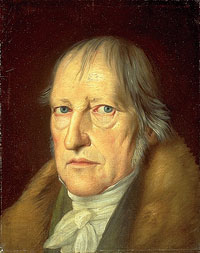
“A nation has its base in religion.”
The preamble includes the phrases such as ‘taking the Will of the God and the Buddha as our own’ and ‘ordain that the true nature of humans as children of God and Buddha is the basis of human dignity’.
This means the acceptance of value judgments naturally accepted in the world – ‘God/Buddha exists and guides the human race’ and ‘Humans exist separated from God/Buddha’.
In America’s 1776 Declaration of Independence, it also stipulated that ‘all men are created equal, that they are endowed by their Creator with certain unalienable Rights’, and it confirmed that human dignity and the basis for human rights lie in the fact that people are ‘the children of God’.
I do not agree with materialistic thought that maintains ‘humans are little more than machines’ and the nation is the same. Hegel, a modern German philosopher, said that ‘a nation has its base in religion’, and perceived the nation to be a sacred organism intrinsically joined with religion.
This proposal is in agreement with that way of thinking. The ‘Will of God and Buddha’ in the preamble is what Hegel referred to as ‘absolute spirit’, and points to a universal God superior to Christ. Religion and the nation are not historically and ideologically opposed concepts. The climate of post-war Japan, in which religion was belittled, is an absurdity from a modern, global perspective.
Religion Protects Democracy
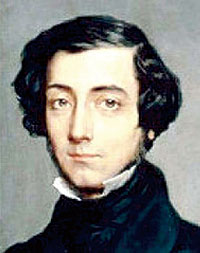
“With the exception of religion, there is no other powerful supporting pillar that can put up resistance for such a long time against the blows of public opinion.”
From the viewpoint of democracy, too, religion is essential.
De Tocqueville, a 19th Century political thinker, who’s known as the ‘guardian of democracy’, reflected on how one could prevent the tyranny of the majority, and authored Democracy in America.
As seen with Hitler’s Nazism, totalitarianism is borne from democracy. In order to prevent this tragedy, de Tocqueville emphasized the importance of moral customs, and cited religion as one of the primary sources for them.
De Tocqueville declared:
‘Public opinion is emerging as that which has the most power, and a power that has the most irresistible force; and with the exception of religion, there is no other powerful supporting pillar that can put up resistance for such a long time against the blows of public opinion.’ (See note)
If religion were to be removed from society, people would no longer be able to tell right from wrong, and public opinion, which the media instigates, would influence politics. De Tocqueville pointed out that religion is the stronghold to protect democracy.
De Tocqueville saw with his own eyes the close connection and oneness between the spirits of religion & freedom, which he considered to be the source of America’s prosperity. Because of his opinion, de Tocqueville warned that ‘materialism was the mortal enemy of democratic citizens’, that it was ‘a dangerous illness of the human spirit’, and that it ‘enticed and pulled people towards material pleasures’.
From this perspective, one can understand that in post-war Japan, it was a mistake to tell the people of Japan that ‘religion must not be involved in politics’. Rather, religion, not being involved in politics, leads to the destruction of democracy.
The current national crises in Japan are happening as a result of these errors. Now is the time for religion to voice its opinion on politics – religion should be actively involved in influencing the political arena. To say that a religious political party is in opposition to the idea of the separation of church and state can only be due to a lack of education.
Note: In Democracy in America, de Tocqueville also pointed out that ‘I have already considered what is necessary for the preservation of the political system for the American people, and I believe that the main factor is religion’.
2. Achieving Both the ‘Protection of One’s Country’ and ‘the Realization of World Peace’
The feature of the proposal in terms of diplomacy and defense is in that it stipulates the ‘protection of the lives, assets, and safety of the citizens’ in Article 5, as well as the ‘realization of world peace’ in the preamble and in Article 1.
It’s easy to make those requirements, however, realizing the goals in reality is not as easy as it would seem, since it means protecting citizens from the threats like China and North Korea (realism) while at the same time, acknowledging the high ideal of eliminating international religious disputes (liberalism).
From solely the perspective of realism, it could be as the political thinker from the renaissance Machiavelli said, ‘You must not work hard at anything except war and military training’, but that alone cannot lead to triumph in the current wars on terrorism and conflicts over religion.
America is currently agonizing over this fact. The emergence of a great power that exemplifies a new religious set of values such as those which can overcome the exclusivity of Christianity and Islam is of importance now.
Column 2.
Q. Will the Imperial household be protected?
A. Members of the imperial household will not be subject to dethronement or capital punishment.
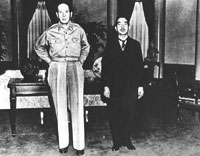
One of the reasons that MacArthur opposed the pursuit of the emperor’s responsibility for the war was that he had come into contact with the emperor’s gracious attitude.
One question that commonly arises in regards to this proposal is ‘won’t you protect the imperial household?’ In fact, the proposal aims to protect the imperial household for many years to come.
It is generally said that ‘the crown cannot survive a war defeat’. Following the First World War, the House of Habsburg in Austria and the House of Hohenzollern in Germany collapsed.
Danger of the same fate awaited Japan after the Second World War. There were strong opinions in the American government that ‘the emperor’s responsibility for the war should be pursued’, but MacArthur refused, and he gave Emperor Showa protection from dethronement and capital punishment.
Even under the current constitution, since it appears that the emperor has real political power, if Japan was to lose another war, there might again be a risk to the emperor’s existence – even more so if the other party were the Chinese government.
From the regency government of the Heian period to the end of the Edo period, it was a cultural tradition for the emperor to be detached from political power, and it was because of his religious existence that the imperial line continued. We should return to the ways of the original imperial tradition. If we hand political responsibility to the president, then it should be enough to keep the imperial household free from harm.
Restoring a Healthy Sense of Patriotism
Protecting one’s own country requires not just a military arsenal, but also a resurgence of patriotism.
Hegel put patriotism forward as the most important national value, and stated that patriotism was the strong spirit of creating an ideal nation through realization of the Will of a universal God.
Hegel wrote in the Outlines of the Philosophy of Right that ‘a nation must be protected, but if the goal of a nation is only to protect life and the property of its citizens, then putting their lives in danger to protect the nation is contradictory and it’s putting the cart before the horse’.
Where we live is a sacred place for creating an ideal nation, and it’s worth putting one’s life on the line for. I would, therefore, like to restore a healthy sense of patriotism.
A Powerful President Means a Good Government
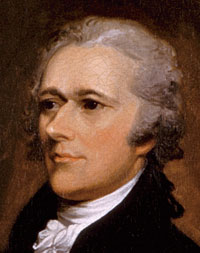
“That the administration is weak is, regardless of whatever anyone says, nothing but bad government.”
The key to achieving both the ‘protection one’s country’ and ‘the realization of world peace’ is in the introduction of a presidential system.
From the perspective of other countries, it’s difficult to know where ultimate responsibility lies in Japanese politics.
Since the Emperor of Japan appoints the prime minister, and welcomes foreign ambassadors, it seems as though the Emperor has some real political power. Since the prime minister is chosen from the Diet’s majority, the opinions of influential people in the governing party are readily accepted, and it’s difficult to see the judgments of the prime minister.
This is no different from the end of the Edo period when it was unclear whether the generals or the emperor had real power, and decision-making was difficult.
In actual fact, America had the same reason for the introduction of the presidential system. Alexander Hamilton, who drafted the United States Constitution and who was one of the Founding Fathers of the United States, said, “That the administration is weak is, regardless of whatever anyone says, nothing but bad government.” Furthermore, Hamilton emphasized that the exercise of governmental rights ‘would be much more appropriately carried out by one individual rather than several individuals’. He stressed the significance of an unambiguous presidential system where the president had ‘absolute’ power, and where the office of the presidency had ultimate responsibility for the course of events of the country.
The Parliament, Or a Different Administrative Organization, and Even the Media Are Unlikely to Obstruct the Presidential System
The biggest merit of a presidential system is the speed of decision-making.
The slowness of decision-making in Japan’s government lies in its collusions with parliament, a lack of leadership by politicians with regard to their administrative organizations, and media faultfinding. If Japan were to introduce a presidential system, and the people were to elect the president directly, then the president could make decisions based on the will of the people, and obstructions by parliament, administrative organizations, and the media would be unlikely.
Our proposal takes into consideration the necessity to clarify the three branches of government, and to put checks on presidential recklessness.
3. To Make the Spirit of Self-Reliance the Foundation of the Nation
Choose Liberty Over Equality
The current Constitution includes a range of rights for freedoms such as the right to own property, but in actual fact, the words ‘to the extent that it does not interfere with the public welfare’, significantly restricts the exercise of them. Deciding this is the bureaucrats and politicians, so in the end, equality rather than freedom is given priority.
In order to keep this in check, there is a necessity to clarify ‘the precedence of liberty’. This is in Article 10 – ‘Equality of opportunity’, ‘Securing freedom’, and in Article 11 – ‘A small government’ and ‘Reasonable taxes’.
The gist is to ‘choose liberty if you have to choose between liberty and equality’, and to build a spirit of self-reliance.
The backbone of this article can be found in the following universal religious perspective: Humans are the children of God and Buddha created by God and Buddha, who are given life-changing opportunities as a result of individual effort. A citizen, living one’s life with a dependency on the government, will have his or her attitude of self-reliance impaired, and in the end that person will not lead a happy life.
Column 3.
Q. Will only 17 articles be enough?
A. The aim is for the ideal of ‘a great nation of liberty’ with a minimum of articles.
There has been criticism that ‘will only 17 articles including the preamble be enough’? However the proposal is entirely different from National Socialism in which there is a barrage of orders. The fundamentals lie in the philosophy of the economist and philosopher Hayek, in which ‘laws should be kept to a minimum so as not to encroach upon the domain of freedom’. The concept of protecting freedom from political power also has similarities with the political philosophies of Locke and Montesquieu.
The American, conservative, grassroots ‘Tea Party’ movement has the same stance, and strongly opposes socialist policies such as the health insurance reforms of the Obama government.
Social rights are not stipulated in the proposal, but since the preamble and first article include provisions such as ‘value harmony’, rights for equality are guaranteed. Since it also includes in its interpretation the imposition noblesse oblige (the obligations of the nobility), in which large corporations and the wealthy help the poor, it puts checks on extreme competitiveness such as that in America.
The proposal stipulates ‘the freedom of political participation by citizens’ (Article 11) in addition to the precedence of freedoms. If this is rather negative liberty for Hayek followers to be able to escape from political power, then it is a positive liberty for individual participation in the creation of public happiness. Arendt, a political theorist from the 20th Century, reasoned that the basic principle of democracy is ‘the foundation of freedom’, with which the will of the people can create the government and laws, and thereby the people make their own fate.
The proposal includes ‘the peace, progress and prosperity of Japan and of the entire world’ (preamble) and the realization ‘world peace’ (Article 1). Citizens are expected to make efforts to achieve this result. While it pursues everlasting ideals, it attempts to realize a Japan, which is a ‘great nation of liberty’.
A New National Model Superior to the American One
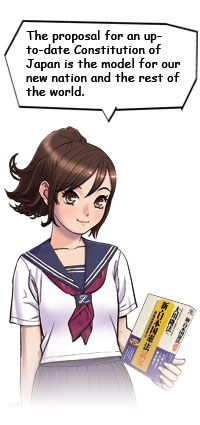 The big job of completely transforming the values of postwar Japan is now necessary. This proposal drafted by has the power and the wisdom to accomplish the job.
The big job of completely transforming the values of postwar Japan is now necessary. This proposal drafted by has the power and the wisdom to accomplish the job.
Hamilton, who drafted the U.S. Constitution, looked back on the independence of America, and said, “The American people have completed a revolution that does not compare to anything in human history. Furthermore, they have established a governmental organization similar to nothing on earth.”
While the waning fortunes of the American superpower are in question, Japan is at the point of ‘establishing a new national model’ superior to what America created.
Will Japan simply stoop to being a minor power, or will it become a world power that can shoulder responsibility for world peace and prosperity? That is the question posed by the proposal for a new Constitution of Japan.

